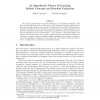16 search results - page 3 / 4 » Learning Halfspaces with Malicious Noise |
FOCS
1999
IEEE
15 years 4 months ago
1999
IEEE
We study the phenomenon of cognitive learning from an algorithmic standpoint. How does the brain effectively learn concepts from a small number of examples despite the fact that e...
107
click to vote
FOCS
2008
IEEE
15 years 6 months ago
2008
IEEE
We study the learnability of sets in Rn under the Gaussian distribution, taking Gaussian surface area as the “complexity measure” of the sets being learned. Let CS denote the ...
COLT
2008
Springer
15 years 1 months ago
2008
Springer
We study distribution-dependent, data-dependent, learning in the limit with adversarial disturbance. We consider an optimization-based approach to learning binary classifiers from...
ICPPW
2006
IEEE
15 years 5 months ago
2006
IEEE
Trust, the fundamental basis of ‘cooperation’ – one of the most important characteristics for the performance of pervasive ad hoc network-- is under serious threat with the ...
107
click to vote
CEAS
2008
Springer
15 years 1 months ago
2008
Springer
Recent email spam filtering evaluations, such as those conducted at TREC, have shown that near-perfect filtering results are attained with a variety of machine learning methods wh...

